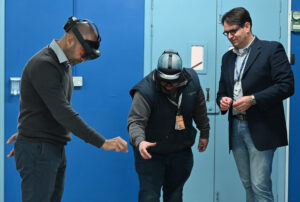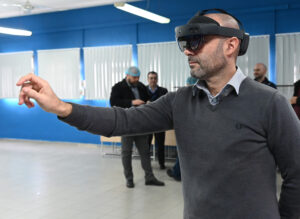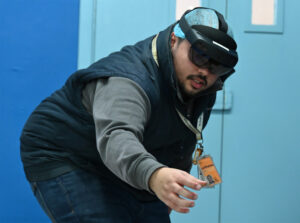MCAST is fast becoming synonymous with the continual adoption of latest technologies and learning techniques in vocational education. In its perpetual quest to continuously offer its current and future learners the best and most innovative learning experiences available, MCAST is very proud to have recently acquired a custom developed Augmented Reality (AR) platform to be used for aircraft engine maintenance training. This system will greatly enhance the learning experience of MCAST’s learners following the various aircraft maintenance programs offered at the college. The advantages and benefits that AR technologies offer in a wide range of applications is nowadays a foregone conclusion, and it was therefore very much expected that the use of this technology would also be embraced by the aviation sector including in aircraft maintenance training. Well aware of its benefits and advantages MCAST immediately embarked on a process to acquire such an advanced system for the benefit of its learners and continue pioneering the local aircraft maintenance training sector.

It should also be pointed out that emerging technologies such as AR are also being deployed in activities related to the continued airworthiness of aircraft. The proper maintenance of aircraft cannot be underestimated and is paramount for the safety of travelling passengers and crew onboard. As an engineering field in the forefront of innovation, aircraft maintenance is constantly evolving with such AR platforms becoming a popular tool in enhancing the maintenance of aircraft. This also justifies the need for current aircraft maintenance trainees to be trained on such technologies for them to be familiar with such tools in preparation for their use in the aircraft maintenance sector. In view of this MCAST also took the opportunity to demonstrate this technology to an initial group of representatives from its partner aircraft maintenance organisations operating locally, where attendees were guided by MCAST academic staff through the various aircraft maintenance tasks in the AR environment.

The event also served as an opportunity for the attendees to appreciate how technology is also changing the aircraft maintenance landscape and how AR is being deployed in the aircraft maintenance industry. The use of AR in this sector spans a number of applications ranging from basic applications such as guidance during visual inspection tasks to more complex applications such as real-time data analysis during performance monitoring of aircraft systems. AR systems are also utilised in applications where remote assistance is provided by component suppliers including engine manufacturers during specific maintenance tasks.
It is due to the wide range of applications for which AR is being deployed on the aircraft hangar floor at Maintenance, Repair and Overhaul (MRO) facilities that AR is fast establishing itself as an invaluable tool in aircraft maintenance training. In this environment trainees are now able to receive practical training without the need of an actual aircraft on site thanks to AR technology. Apart from the obvious cost implications of not requiring an actual aircraft during training sessions, training on multiple aircraft variants on the same AR platform can be offered all year round.

Furthermore, aircraft maintenance training is preferably conducted during quieter aircraft maintenance periods during the year, usually coincident with periods of high aircraft operational demand. Naturally this results in a lack of availability of aircraft for training purposes and hence delays in conducting practical training for aircraft maintenance personnel. It is therefore unsurprising that aircraft maintenance training organisations are embracing this emerging technology. Conducting training in an AR laboratory, when compared to the aircraft hangar, is also beneficial as it reduces disruptions to ongoing aircraft maintenance operations whilst training is conducted in a safer environment away from the inherent hazards associated with working in an aircraft hangar. Furthermore, maintenance errors during training do not result in costly repairs or aircraft delays which may disrupt tight schedules typical of the aviation industry.
AR platforms also provide aircraft maintenance trainees with the opportunity to practise learned skills using virtual aircraft models which realistically simulate the real-world environment. Aircraft system faults may also be simulated offering the trainees an opportunity to practise troubleshooting skills. Furthermore, the immersive and therefore more engaging learning experience provided by AR platforms has led to accelerated learning curves for trainees and a higher retention of knowledge.
The completed AR system that has recently been acquired by MCAST has now been fully installed at the AR Laboratory at the Aviation, Transportation and Logistics Department within the Institute of Engineering and Transport, at MCAST’s Main Campus in Paola. MCAST academic staff offered technical support and their expertise in the aircraft maintenance sector during the implementation of this AR project, following which they were given specific training in the use of this technology as an effective training aid.
Students currently enrolled on Aircraft Maintenance programs at MCAST have already started benefitting from this new and innovative learning experience. MCAST intends to hold further sessions to demonstrate the advantages of AR technology use to other interested stakeholders within the local aviation sector.







 MCAST Main Campus
MCAST Main Campus  +356 2398 7100
+356 2398 7100
 information@mcast.edu.mt
information@mcast.edu.mt